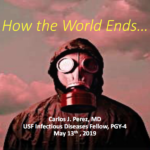
Monday, April 27, 2020
Category: Hepatitis-Viral, Immunocompromised Host, Infectious in Oncology, Mycobacterial Infections, Parasitic infections, Viral Infections
Dr. Perez-Lopez discusses the association of certain infectious diseases as a factor in the development of cancer. These so-called “oncogenic” microorganisms can induce both solid organ and bone-marrow-related malignancies through a variety of mechanisms. Among the oncogenic viruses, Epstein Barr Virus, Human Papilloma Virus, and the Hepatitis B and Hepatitis C viruses are well-known causes of cancer, causing EBV lymphoma, cervical cancer, and hepatocellular cancers, respectively. But bacterial infections can also induce malignancies, as Helicobacter pylori’s association with MALT lymphoma demonstrates. In addition, the speaker explains, as we understand the pathogenic mechanisms behind many bacterial agents (e.g., Pseudomonas), we are learning ways we can use their infectious potential as a treatment mechanism against certain medical conditions. Dr. Perez-Lopez closes his talk by discussing how the oncogenic potential of viruses is now an emerging weapon in our therapy against many diseases. By utilizing their ability to incorporate their genome into cells, certain viruses are a potent tool in gene therapy via genetic modification.
Stay in touch! Download our app in the iTunes store or the Google Marketplace.

